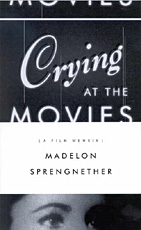Films can be a catalyst to deep and valuable inner work. They provide hope and encouragement, help us reframe problems, provide role models, draw out our emotions, enable us to prioritize our values, and open doors to unexplored territory. Some psychologists actually use movies to enhance traditional therapy.
Madelon Sprengnether is professor of English at the University of Minnesota where she teaches critical and creative writing. At the age of nine, she watched her father drown in the Mississippi River. She writes in this poignant memoir: "The trauma of my father's death was such that it prevented us from grieving. Yet grief that is not felt or acknowledged does not dissipate; it goes underground, where it flourishes, like some evil plant, in secret and debilitating ways."
The turning point for Sprengnether happened in a movie theater. While watching Pather Panchali, the first of Satyajit Ray's trilogy of films, she found herself weeping profusely over the struggles of an Indian family. She realized that the twilight zone of the movie theatre offered her a chance to get in touch with emotions she had suppressed. Over the years it became a place where the past could be relived and perhaps even given a reworking.
With great finesse, Sprengnether discusses the movies that spoke to her over the years helping her come to terms with her father's death and other unresolved issues in her life. She interprets the silences in House of Cards, the repetition in Solaris, the role of will in The Piano, transgressions in The Cement Garden, surrender in Shadowlands, and grief through Blue.
Anyone who loves movies and treasures them as catalysts for soulmaking will find this unusual and satisfying book to be good medicine.
